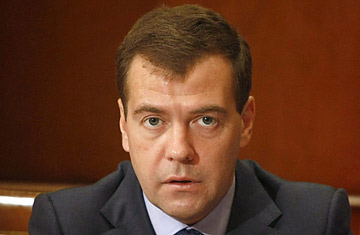
Russian President Dmitry Medvedev.
The European Union's decision to normalize the ties with Russia it briefly suspended in the wake of last summer's Georgia conflict is a textbook illustration of pragmatic self-interest trumping principle in the conduct of foreign policy. The resumption of ties will be consecrated on Friday when E.U. leaders meet with Russia's President Dmitri Medvedev in Nice on Friday, to reopen negotiations on a diplomatic and economic partnership that had been put on hold in August after Russia's military campaign against its tiny neighbor.
"European relations with Russia have always been rather cynical — far more willing to forgive or ignore Russian excesses than the U.S. has been," says Fabio Liberti, a European affairs and defense specialist at the Institute of International and Strategic Relations in Paris. "In this case, some European leaders awaiting the arrival of the new Obama administration are keen to rekindle Europe's special relationship with Russia. That not only plays to European business and energy interests with Moscow, but also advances the desires of some leaders to further increase the E.U.'s diplomatic profile in the world during the final, immobile culmination of the Bush presidency."
But the elephant in the room when Medvedev joins his E.U. counterparts in Nice on Friday will be the evidence that Moscow has failed to fulfill requirements laid down by Europe for the restoration of normal relations. When the E.U. in September halted negotiations on expanding an earlier accord on trade and political cooperation, the stated condition for resuming those talks was the withdrawal of Russian troops to positions they held before the confrontation with Georgia exploded in August. Moscow has not entirely met that requirement, and has even upped the ante of its defiance elsewhere — most recently with Medvedev last week threatening to deploy new missiles near Russia's border with NATO-aligned Poland, in response to the installation there of a U.S. missile-defense system deemed threatening by Moscow.
Still, European nations decided on Monday to resume talks on a new trade and diplomacy pact. So, why the change of heart? European leaders realized they had far more to lose than to gain in holding out on a point of principle — and the considerable economic pain Russia has suffered from global financial turmoil and falling oil prices has led the Kremlin to also conclude that it's time to kiss and make up. "The question of the financial crisis has come to the fore," said Russia's ambassador to the EU, Vladimir Chizov. "It is on this question that we begin our conversation at the [Nice] summit."
In a joint statement on the E.U.'s revival of talks with Russia, British Foreign Secretary David Miliband and his Swedish counterpart, Carl Bild, reversed the hard line they had adopted during the Georgia crisis. Pushing ahead towards new agreements between the E.U. and Russia, they wrote, is "a pragmatic way of pursuing our interests across a range of important issues, like energy, climate change and trade, as well as deepening the rules-based framework to our relationship".
A range of immediate European interests also dictate the more pragmatic course. As Liberti notes, "winter is coming" and a Europe that imports some 40% of its energy needs from Russia wants to avert the periodic cuts in supplies that Moscow inflicted for political reasons last year. And with oil prices now nearly half of what they were six months ago, European leaders may feel they have more power to dictate conditions of sales and delivery with Russia.
And then there's the fact that European leaders, foremost among them Italian Prime Minister Silvio Berlusconi and French President Nicolas Sarkozy, share their public's view that confronting Moscow is a mistake. Not only have they successfully pushed for normalizing relations with Russia, they have opposed moves such as the deployment of the U.S. missile-defense system in Eastern Europe as an unnecessary provocation.
"Berlusconi, but even more so Sarkozy are positioning the E.U. to play a mediation role between the U.S. and Russia, while also enhancing Europe's diplomatic and economic interests," Liberti says. "That action on the Russian dossier is part of the wider effort to keep raising the E.U.'s role as an actor in international diplomacy. The Bush years created a huge void in foreign relations that Sarkozy has exploited to increase European influence. Now, he's doubling those efforts anticipating renewed American influence as Obama — and Obamanania — come into play."
